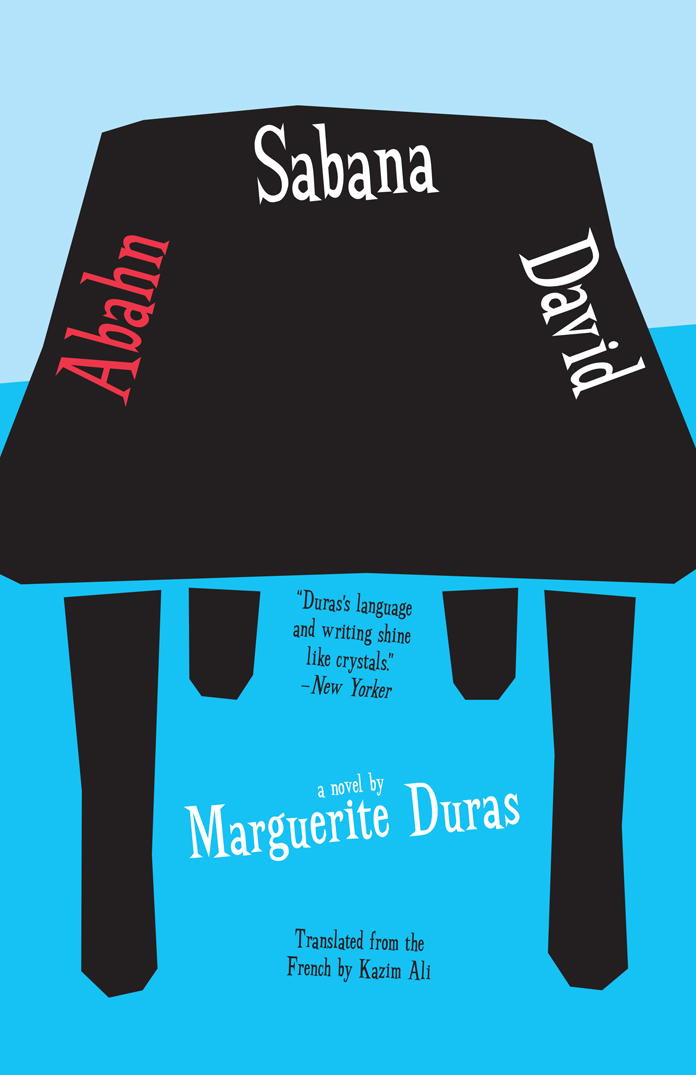
Abahn Sabana David
کتاب های مرتبط
- اطلاعات
- نقد و بررسی
- دیدگاه کاربران
نقد و بررسی

April 11, 2016
The three title characters in Duras’s provocative novel, first published in France in 1970 and now available in English for the first time, meet at a country house on a cold night. David and Sabana have come from an unspecified city with the intention, readers learn at length, of killing Abahn, whom they call “the Jew.” A fourth character, referred to as “the Gringo,” arrives later. (His name also happens to be Abahn.) They talk about race, politics, history, and political parties in a manner reminiscent of absurdist theater. Dogs howl, people cry without realizing it, and a gun is brandished and eventually fired. Duras’s sleek prose unfurls like poetry: terse, punchy sentences that often move down the page rather than across it into paragraphs. The language is repetitive, often elliptical, digging at concepts in multiple passes. Often the spare language achieves a provocative resonance: “They are silent once more. David cries out suddenly. He does not wake, just cries out a little.” Depending on a reader’s temperament, it can engross or frustrate. Those swept up in Duras’s elegant imbroglio may read it in a single sitting, then tackle it again.

April 15, 2016
In English for the first time, a 1970 French novel from prolific experimentalist Duras (The Lover, 1984, etc.) In this brief novel the action is staged like an existentialist thriller, the prose reads like surreal noir, and the crime taking place is genocide. On a cold night in a town called Staadt (identified later as Prague), a Jewish man named Abahn is visited at home by a woman, Sabana, a stonemason, David, and another Jewish man also named Abahn. David has a gun, and Sabana tells the second Abahn that the first Abahn, whom she calls "the Jew," will die at daybreak thanks to Gringo, the local leader of "the Party." They spend the night deep in debate about their roles and motivations in the plot to kill Abahn the Jew. As dogs howl outside, the characters sometimes go deaf and blind, speaking while half-asleep about gas chambers, Soviet concentration camps, "the field of death," and, awkwardly, "the sliding scale of the minimum wage." Dialogue gets repeated back and forth as if the group is questioning each word's meaning; their movements are logged meticulously, adding great tension to some scenes, absurdity to others, and translator Ali's deft touch rendering this unreal environment's slippery fictive power is laudable. Duras positions the book's moral center as a question of self-awareness, forcing Sabana and David to see how outside forces affect their smallest actions and thoughts: as the second Abahn says to Sabana, "I say if it's David who pulls the trigger, it's still Gringo who has killed him." As gunfire erupts late in the book, David and Sabana must face the temptation to absolve themselves from blame by letting the faceless state take responsibility for their parts in the violence.Despite some clunky political commentary, a gripping meditation on the nature of fear, silence, and survival.
COPYRIGHT(2016) Kirkus Reviews, ALL RIGHTS RESERVED.

June 15, 2016
It's hard to imagine anything by durable French author Duras left to translate into English, but here it is. Written late in her career, when she was abandoning her communist sympathies, this novel is set in 1968 in an unnamed country controlled by a repressive political party. As night falls coldly, Sabana and David arrive at an isolated house to stand guard over Abahn, who will be executed in the morning by local party leader Gringo for certain offenses--what Abahn has done and why remain vague even to him. Abahn is also called the Jew, though Jews here seem to stand for anyone in opposition; the appearance of another man named Abahn further clouds the situation. In fact, David, who claims he's not part of Gringo's party, has surprising reasons of his own for being there. VERDICT Beautifully cut to the bone yet increasingly absurdist, the narrative delivers an unsettling sense of ideology run amok. It's challenging and not always satisfying but will attract those serious about their reading.
Copyright 2016 Library Journal, LLC Used with permission.

























دیدگاه کاربران